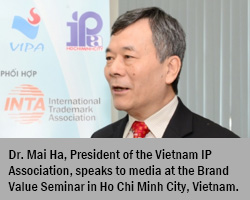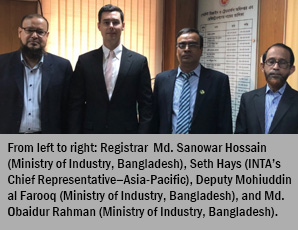INTA Addresses Plain Packaging Law, Counterfeit Goods, Brand Value
Published: March 15, 2019
During the first quarter of 2019, INTA has actively engaged multilateral organizations, building new partnerships and fortifying existing ones across the spectrum of intellectual property (IP)-related government organizations and addressing urgent policy issues that are affecting brand owners.
Concerns About Plain Packaging Law
On the occasion of INTA’s 2nd Annual Asia Moot Court Competition, which was held in Singapore March 1‒2, INTA’s Chief Executive Officer Etienne Sanz de Acedo visited Singapore to attend the competition and to meet with a range of authorities in the city-state.
On February 28, INTA met with the Ministry of Law and representatives from customs to discuss recent changes in Singapore’s IP regime, including the recent passage of tobacco product plain packaging laws and changes in Singapore’s customs regulations affecting the trade in counterfeit goods.
INTA raised concerns about the passage of plain packaging laws, namely that this could cause an increase in the trade of counterfeit goods; and this might encourage health activists to push for plain packaging and brand restrictions in other product categories.
INTA shared its recent amicus curiae brief with regard to the appeal of the World Trade Organization (WTO) panel decision on Australia’s plain packaging law. INTA believes that WTO’s initial ruling was made in error, and that the TRIPS Agreement does protect trademarks from “unjustifiable encumbrances,” such as plain packaging.
INTA noted that Singapore recently amended its customs regulation to allow for export control of goods found to be infringing trademarks (previously only imports could be stopped). The Association noted that while this was a clear step forward, brand owners remain most concerned about the transshipment of counterfeit goods through Singapore’s very busy ports. Recent case law under the Megastar case, which holds that freight forwards must have knowledge of counterfeits to be held liable, is a major concern for brand owners. INTA offered to work with customs on improving the enforcement situation.
Brand Value Promotion
Recent research released by Brand Finance, an independent branded business valuation consultancy, indicates that of the top 500 brands by value in the world, only eight come from Southeast Asia. This indicates the tremendous opportunity for companies in Southeast Asia to focus on brands and trademarks as essential intangible assets to drive business growth at home and abroad. As part of INTA activity in the region, the Association has been supporting education and training to help companies focus on and build world-class brands.
INTA worked with the Vietnam Ministry of Science Technology, the Vietnam IP Association (VIPA), the Vietnam Chamber of Commerce and Industry (VCCI), and the World Intellectual Property Organization (WIPO) to organize the second in a seminar series for Vietnamese companies on February 26 in Ho Chi Minh City, Vietnam.
 Opening the Brand Value Seminar, Dr. Mai Ha, President of VIPA, stated that brands are the key for Vietnamese businesses to remain competitive, as multinational companies are aggressively seeking market share, and as the Vietnamese economy opens further under free trade agreements, such as the Comprehensive Progressive Trans Pacific Partnership or forthcoming Regional Comprehensive Economic Partnership.
Opening the Brand Value Seminar, Dr. Mai Ha, President of VIPA, stated that brands are the key for Vietnamese businesses to remain competitive, as multinational companies are aggressively seeking market share, and as the Vietnamese economy opens further under free trade agreements, such as the Comprehensive Progressive Trans Pacific Partnership or forthcoming Regional Comprehensive Economic Partnership.
Also delivering opening remarks, Nguyen Nhu Quynh, Deputy Chief Inspector of Ministry of Science and Technology, focused on the constant drive for improvements in the face of an evolving business environment. She said that online counterfeiting and e-commerce present many difficulties for the law, and noted the close cooperation with industry to help solve these problems.Peter Willimott, Senior Program Officer, WIPO Singapore Office, spoke on the importance of registering rights and the advantages of using tools such as the Madrid Protocol.
INTA’s Chief Representative‒Asia-Pacific, Seth Hays, remarked that the macroeconomic data produced by INTA in 2017 shows a clear correlation between economic development and trademark intensity of an economy. As Vietnam seeks to continue developing its economy, the creation of brands and protection of trademarks will be essential, he observed.
Johnathan Ooi, Deputy General Director, Valuation Advisory Department, PWC Vietnam, spoke on the accounting basics with regard to valuing brands, including the various methodologies involved.
Paul Middleton, Director of Business Development, Japan Tobacco International, provided an apt warning on how global regulatory risks exist for businesses that are developing and commercializing brands. He shared with the group a number of exhibits regarding the encroachment of regulations on brand owners in tobacco, including plain packaging, and in the food and beverage industry.
Yuki Wada, Senior Associate, Client Services & Solutions, Interbrand Japan, emphasized how his consultancy urges companies to think of brands as much greater than merely trademarks, or extensions of marketing, but rather as an essential and all-encompassing business process that should be a company-wide concern.
INTA looks forward to continuing the work in Vietnam to raise awareness on brands, and will work with VCCI and VIPA to focus attention on brands for business, including projects for later this year which will include awards and further training for brand-focused companies.The event in Vietnam was heavily covered by news outlets in Vietnam; examples of coverage are here, here, and here.
Brand Value in Indonesia
INTA’s brand-building efforts were also undertaken in Indonesia, as INTA joined a seminar hosted by Deloitte Indonesia, entitled, “ASEAN Innovation Insights: The Rise of Creative Economy: Leveraging on Innovation to Drive Business Growth.”
Held in Jakarta, Indonesia, on March 6, the seminar gathered Indonesian government policy makers, and cutting-edge industry players to discuss the challenges and opportunities in valuing brands and IP, and how to better manage these assets.
Keynote speaker, Ricky Pesik, Vice Chairman of Indonesia Creative Economy Agency (BEKRAF), shared the evolution of the agency. Founded in 2015 by President Joko Widjojo, the agency’s goal is to foster innovation in Indonesia, Southeast Asia’s largest country by population. He noted that UNICEF has said that Indonesia is the world’s richest country-in terms of cultures. (A quick fact backs this up; on the single island of Papua, New Guinea (Indonesia has more than 4,000 islands), there are more than 400 separate tribes.) Mr. Pesik noted that in order to achieve UN sustainable development goals, innovation in the economy will need to be an essential part of any solutions. He noted that research undertaken by BEKRAF showed that 7.4 percent of gross domestic product comes from the creative economy, accounting for 16 million jobs, more than 6 million companies, and 20 percent of net exports.
Keoy Soo Earn, Deloitte Southeast Asia Financial Advisory, Regional Managing Partner, Merger & Acquisition Leader, delivered a follow-up keynote address, focused on the need for investing in intangible assets as the key to unlocking value from economic and technological disruption. He noted the “ABCs” of the new economy-artificial intelligence, blockchain, and cloud computing.
South Asia Outreach Initiative
As part of INTA’s efforts to expand outreach in Asia to jurisdictions in South Asia, the Association organized a delegation of staff and members to Dhaka, Bangladesh, as part of an INTERPOL training for police on fighting counterfeit goods February 19‒20.
 Mr. Hays met with members from Bangladesh at a dinner reception to hear from them about recent developments in the country, and ways for INTA to further cooperate and support the trademark community. INTA also met with representatives from the Bangladesh IP Forum, a nonprofit group dedicated to raising awareness of IP issues in Bangladesh.
Mr. Hays met with members from Bangladesh at a dinner reception to hear from them about recent developments in the country, and ways for INTA to further cooperate and support the trademark community. INTA also met with representatives from the Bangladesh IP Forum, a nonprofit group dedicated to raising awareness of IP issues in Bangladesh.
In addition, INTA made the first outreach to the IP Office of Bangladesh, meeting with the Chief Registrar February 19‒20 in Dhaka. Registrar Md. Sanowar Hossain of the Ministry of Industry shared plans for Bangladesh to join Patent Cooperation Treaty and Madrid System.
INTA’s Asia Pacific Representative Office, based in Singapore, represents the Association’s 815 members across the region. Working in collaboration with staff at INTA’s headquarters in New York City, the Asia Pacific Representative Office leads the Association’s policy, membership, marketing, and communications initiatives throughout this region. To learn more about INTA’s activities in the Asia Pacific, please contact INTA Chief Representative Officer Seth Hays at [email protected].
Although every effort has been made to verify the accuracy of items in the INTA Bulletin, readers are urged to check independently on matters of specific concern or interest.
© 2019 International Trademark Association
This website uses cookies so that we can provide you with the best user experience possible. Cookie information is stored in your browser and performs functions such as recognising you when you return to our website and helping our team to understand which sections of the website you find most interesting and useful.
To find out more please see our Cookies Policy and Privacy Policy.
These cookies are used to identify a user’s browser as the visitor goes from page to page on the Site. These are session cookies, which means that the cookie is deleted when you leave the Site. It is an integral piece of the Site software and used to let the server know which users are on the Site at any given time and make certain parts of the Site easier to use.
|
|
If you disable this cookie, we will not be able to save your preferences. This means that every time you visit this website you will need to enable or disable cookies again.
These cookies are used to collect information about how visitors use our Site. The cookies collect information in anonymous form, including the numbers of visitors to the Site, where visitors have come to the Site from, the pages they visited and how they have interacted with tools on the Site like search and embedded media players. We use the information to compile statistical reports of our users’ browsing patterns so that we can improve the Site.
|
|
Please enable Functionality Cookies first so that we can save your preferences!
These cookies are used to deliver advertising relevant to the interests of visitors to our Site. They are persistent, which means they will remain on your device after you leave the Site.
- Facebook (Ad Pixel)
- Google (Ad Pixel)
- LinkedIn (Ad Pixel)
- Quattro Anonymous
Please enable Functionality Cookies first so that we can save your preferences!
